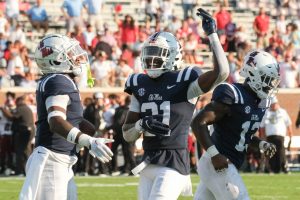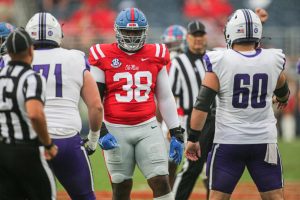
Things sure have changed since 1962. The Ole Miss football team was coming off a 9-2 season and a Cotton Bowl berth against Texas, the Cuban Missile Crisis was just beginning and William Faulkner had just passed away.
Something that has stuck, though, is the story of James Meredith. A figure encapsulated in bronze but whose name and courage could never be bound by any element. This year, we celebrate 60 years since he first stepped foot on campus.
Two of the more dynamic defensive players on Ole Miss’ football team this season took some time to talk about racism and remember the impact that Meredith had on the University of Mississippi.
Safety AJ Finley and defensive tackle KD Hill, natives of Alabama, talk about their perceptions of racism growing up in the South.

Photo courtesy Reed Jones/Ole Miss Athletics.
“We’re thankful for his bravery and his courage to be able to do that by himself,” Hill said about Meredith. “If it weren’t for him, we wouldn’t be here.”
Hill went on to talk about how Meredith’s story gives African Americans hope to “do amazing things in life, and that if he can do it, we can do it too.”
Hill couldn’t be more spot on. In the years following Meredith’s admittance into Ole Miss, many barriers were broken in short succession, such as the first Black women to graduate from Ole Miss in 1968.
“Just remembering what happened. I feel like that’s important for people to do, remembering that what he had to go through wasn’t easy,” Finley said.
Finley would go on to express the importance of the university honoring Meredith by holding several events diving into the history of the occasion.
“I think not forgetting what happened and what he had to go through and to see the school acknowledge what happened really means a lot,” Finley said.
With both Hill and Finley being from Alabama, they are very much aware of the tainted past of the South, and even though neither have been victims of racism, they both acknowledge that it is still an issue.
“I really didn’t look too much into that because it’s going to be everywhere you go and not in just one particular spot,” Finley said. “For me, knowing who you are as a person and how to handle stuff like that is the biggest thing.”
Hill also shared his thoughts on the topic.
“I didn’t even think about any racism or anything. I was raised in the South but personally I never witnessed it. All I know is that we are all God’s children and we have to love each other,” he said.
Sentiments like this are crucial to understanding the weight this celebration carries. Sixty years ago, there wasn’t much love going around on the campus of Ole Miss. But for Meredith to be able to persevere and conquer the endless hate that was thrown at him sends a message that rang and has continued to ring throughout this school. While the past will never be able to be undone, it is crucial to acknowledge those scars in order to have a better present and future.
























